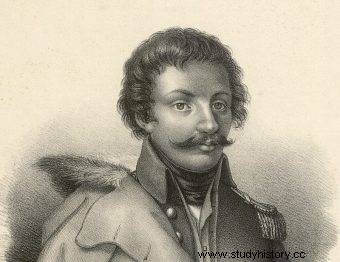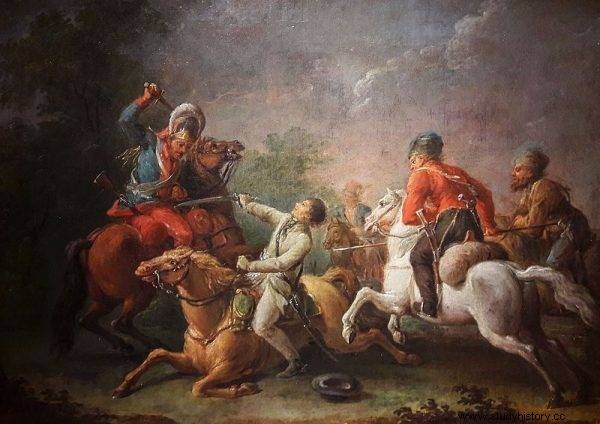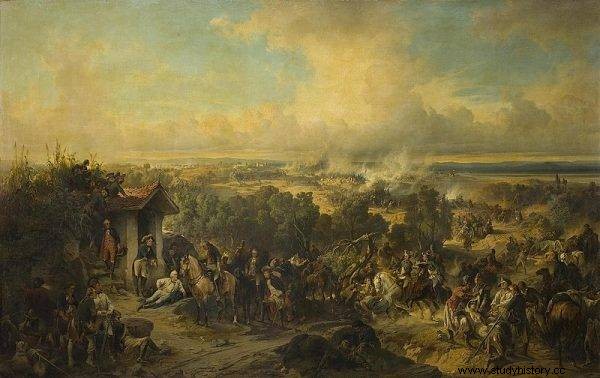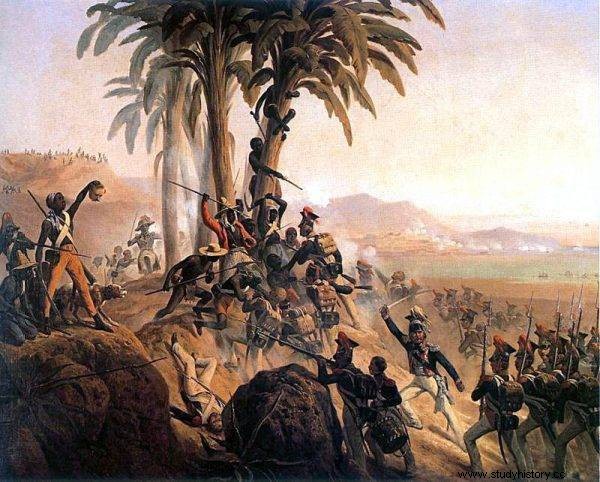General Władysław Jabłonowski was called a "negro". Not without reason - he was the only Polish black general. He became famous in the defense of Prague, in the battles on the Apennine peninsula and on San Domingo.
Władysław Jabłonowski was the son of the general of the Crown Forces and the inspector of the royal mint, Konstanty Jabłonowski and Maria Franciszka Dealire. Or at least on paper. The dark complexion of the skin revealed that Konstanty could not be Władysław's biological father. Moreover, Maria Franciszka made no secret of the fact that the boy was the fruit of her short-lived love affair with the footman.
Konstanty forgave her this moment of weakness, especially as he was an unfaithful himself. He made Władysław become his son and treated him like his own child. He took care of his education and physical development. In keeping with family tradition, he sent his son to a cadet school. In the case of young Jabłonowski it was one of the best schools in the world - the French École de Brienne in Brienne-le-Château.

General Władysław Jabłonowski was called "the Negro". Not without reason - he was the only Polish black general.
At school, he was for one year with Napoleon Bonaparte. Many authors say they have become friends. This is not true. Bonaparte, known for his racist views, treated the young Pole with superiority and contempt. This was also evident during Jabłonowski's nomination to the general of the French army. Władysław made friends with Louis Nicolas Douvat - the future marshal and one of the most outstanding commanders of the Napoleonic field wars.
A brilliant career
Jabłonowski was promoted to second lieutenant in 1786, at the age of 17. A year earlier, he began an internship in the French regime, Royal Allemand. In just eight years he was promoted to the rank of lieutenant colonel. He joined the revolution as a major in 1791, but it is not known what role he played in it. Due to his involvement in the fighting in France, he did not take part in the Polish-Russian war.
Instead, he managed the Kościuszko Uprising. He applied for release from the French service and went to Poland, where he took part in the lost battles of Szczekociny and Maciejowice . Together with Poniński's corps, he withdrew to the north, to Warsaw. There he took command of the Krakow grenadier battalion and the Krakow militia, with whom he took part in the battles for Praga.

Jabłonowski took part in the lost Battle of Maciejowice
The commander of the defense of Praga and Warsaw, General Józef Zajączek ordered him to take command of the forces defending the right wing. Weak fortifications were manned mainly by demoralized and exhausted Lithuanian troops who have been in combat for weeks and have suffered heavy losses in retreats.
The Russians attacked the left wing, headed by General Jakub Jasiński. The Orthodox Church Light Horse Regiment, commanded by Berek Joselewicz, was smashed. A moment later, General Jasiński was killed. In order not to lose the remaining strength, Zajączek ordered to withdraw to the left bank of the Vistula.
Moments later, the slaughter of the inhabitants of Prague began. According to various sources, between 5,000 and 20,000 civilians were murdered. The next day, Warsaw surrendered without a fight. The uprising collapsed soon, but Jabłonowski gained a reputation as a good tactician and efficient organizer.
Under conspiracy
In 1796 he was one of the founders of the Central Assembly, established in Krakow to fight against all three partitioners. Soon after, the headquarters of the organization was moved to Lviv and went down in history as Lviv Centralization. It mainly gathered nobility from the Russian and Austrian partitions. She has not recorded any spectacular achievements.
In 1797, Władysław Jabłonowski was sent on a mission to the Ottoman Empire, where he was to talk with representatives of France and the Empire about actions against Austria. At that time, members of the Lviv Centralization under the command of Joachim Deniski made an attempt to provoke the incident in Bukovina and thus trigger a Turkish-Austrian war. The action ended with the breakdown of troops near Dobronowce, and then the arrests of members of the organization remaining in Lviv and Krakow. Jabłonowski's mission lost its raison d'être. The young colonel went to France.
In Legions
In 1798 he was appointed head of a cavalry brigade in the Roman army under the command of Jerzy Franciszek Grabowski. He was then in the middle of a conflict between Generals Grabowski, who wanted to create the Lithuanian Legion, and Dąbrowski, who formed the Polish Legion. He opted for Grabowski, but did not take a tough position that would prevent him from further career.
As a soldier of the Roman army, he took part in the Franco-Neapolitan war, where he commanded 200 Roman legionnaires during the Battle of Santa Maria di Falari. Then he took command of the French brigade of Gen. Jean-Pierre Pouget's 2nd Division, and then of the Rifle Brigade of Gen. François Jean Baptiste Quesnel's Light Cavalry Division, with whom he took part in the battles of Magnano and Cassano. After the victorious battle of Trebbia, he moved to the Polish Legions. He was promoted to brigadier general on May 20, 1800. He became one of the first black generals in history.

After the victorious battle over Trebbia, he moved to the Polish Legions
As a legionnaire, he fought under Bosco and Posturana. He then commanded the Legion during the fighting in the Alps. In 1800 he became the commander of the flanker corps of the right bank of the Po, and after a few months he took over the command of a brigade in the infantry division of General François Watrin. Nevertheless, Napoleon Bonaparte still refused to be promoted to Brigadier General of the French Army.
Only the pressure of Dąbrowski and Maj. Gen. Joachim Murat, then Bonaparte's brother-in-law, caused that in February 1802 he was promoted to general also in the French army. He also took command of the selected 3rd Infantry Half-Brigade, later renamed the 113th Half-Brigade.
Death in the Caribbean
Jabłonowski headed the demi-brigade for only three months. In May 1802, he handed over the command to Col. Michał Sokolnicki and on the personal order of Bonaparte he went to San Domingo in order to investigate the situation before transferring Polish soldiers there. After the peace at Lunéville, the legionnaires became quite a problem for Napoleon as they were openly anti-Austrian. So he decided to send them to the Caribbean, where they were to suppress the independence aspirations of the Haitians.
The general was not happy with what he saw. Difficult terrain, unfavorable climate and heavy battles fought by the French did not bode well . The more so that the Poles suffered losses even before joining the fight. Near Elba the ship transporting them sank and over a hundred legionaries died at sea.

After the Lunéville peace, the legionnaires became quite a problem for Napoleon as they were openly anti-Austrian. So he decided to send them to the Caribbean, where they were to suppress the independence aspirations of the Haitians.
Jabłonowski took command of a mixed French-Polish division with which he took part in the Battle of Bourg aux Matheux. The brilliant career of the general was interrupted by death. In September 1802, he developed yellow fever. He died on September 29 in Jérémie, the city where another outstanding black general - Tomasz Aleksander Dumas was born.
He was also buried there the next day, because "the property of the climate was so terrible that two hours after his death, his body was spilled like black tar, only the bones remained".
